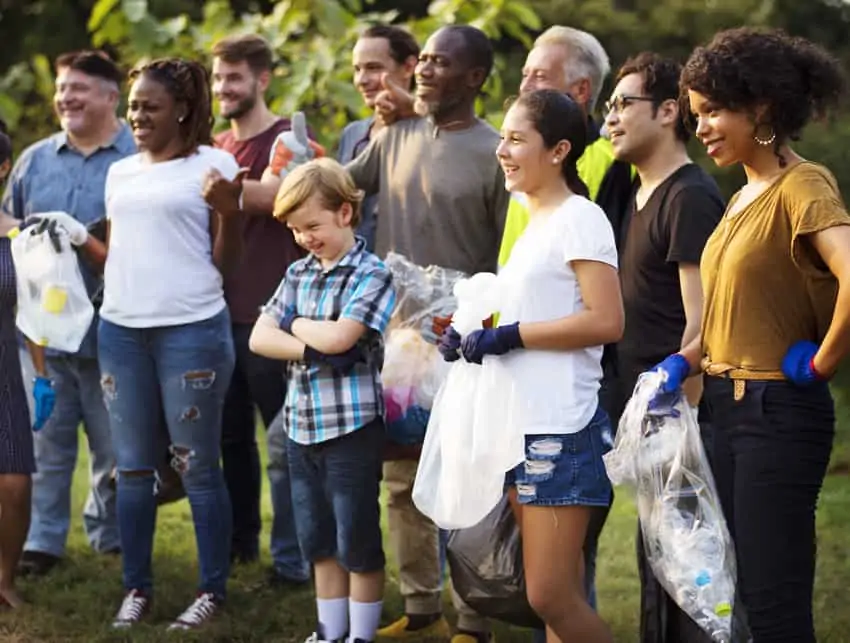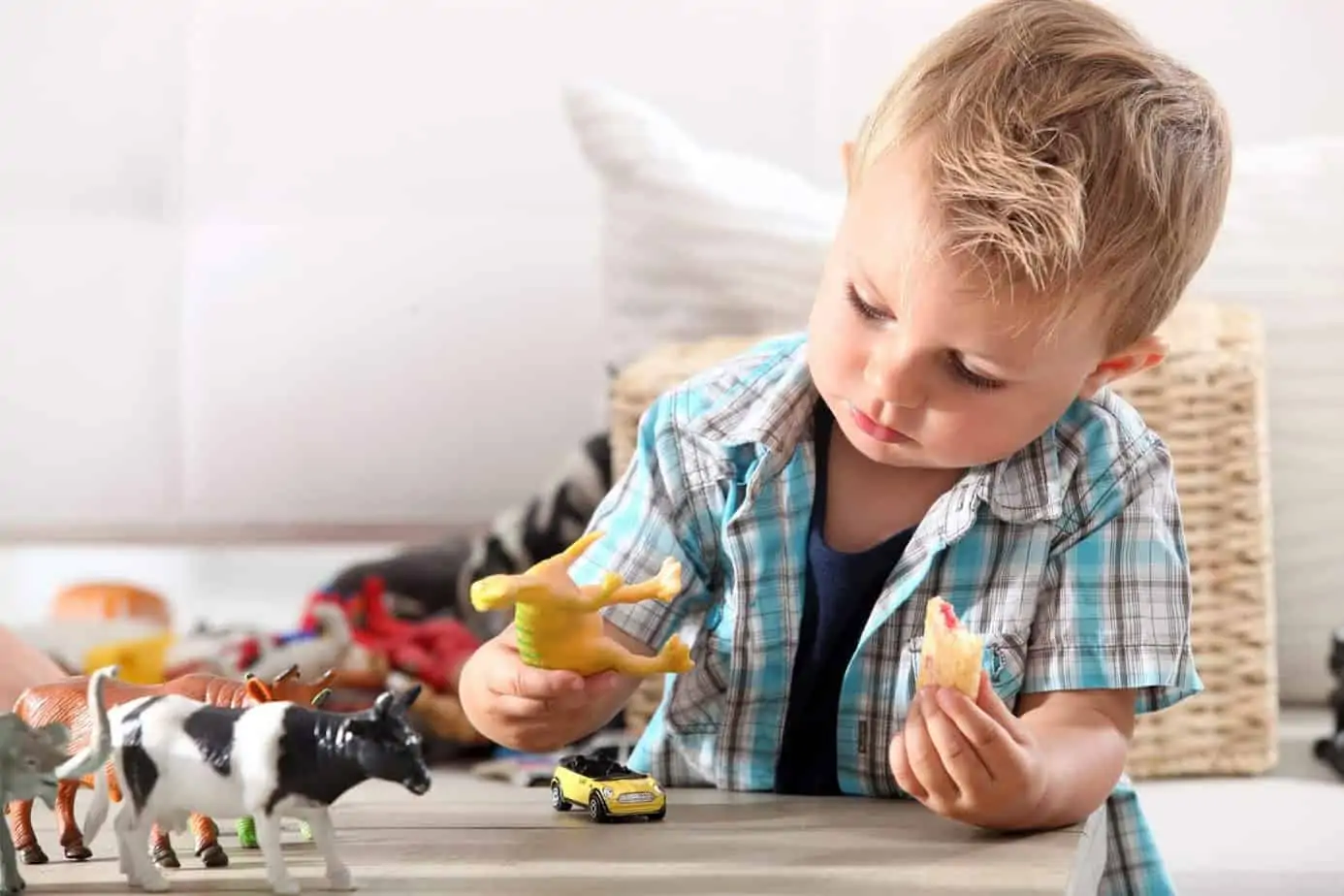Inside: Learn practical tips to get kids to clean up their mess and be active participants in picking up around the house.
Tips To Get Kids To Clean Up Their Mess
Finding the motivation to clean is tricky for all of us – even as adults.
And building that motivation in our children can sometimes feel impossible. As children, it’s hard to understand the importance of keeping a clean space. And as parents, it can be tricky to keep our cool when the house is a mess, and we’re more than a little overwhelmed.
Luckily, there are steps you can take to help encourage kids to clean, tidy, and take responsibility for their space.
Not only is this a helpful process for you as parents, but it’s also teaching foundational life skills to your kids that they will take with them well into their futures.
15 Tips to Get Kids to Clean up Their Mess
Struggling to get your kids to clean up after themselves? Try these simple ideas to help make cleaning an essential part of their day-to-day!
1) Establish a routine
The easiest way to make something a habit is to do it over and over again.
Establish a clear routine with your children, including:
- When you clean
- How often you clean
- Clear expectations for what “clean” means
When you make a tidying process part of your everyday routine, kids will likely begin picking up after themselves with fewer verbal cues over time.
While practice doesn’t necessarily make perfect, it does make things a lot easier.
2) Use a visual aid
We all need reminders once in a while.
Providing kids with a visual aid, like an:
- Interactive chore chart
- Notebook
- Wheel
will remind them of their necessary tasks.
3) Provide choices
Often, kids will push back when told to do something.
Have you ever been planning on doing a task, and then a parent or partner asks you to do the same task (or demands it)? You likely lost all of your motivation. Because when it feels like our agency is being taken away, we instinctively push back.
When asking your kids to tidy up, consider giving them a small choice to help them maintain some level of agency.
This doesn’t mean they get to decide whether or not they’re going to clean – it’s a smaller choice than that.
For example, ask your child: “do you want to clean up now or in 30 minutes?” or “would you rather clean your room first or your playroom?”.
This small tweak can make a major difference.
4) Model the action
It’s hard to request that our kids clean up after themselves if we don’t model the same behavior.
Kids imitate what they see. So if you’d like them to have good cleaning habits, you need to have them as well.
And I get it; keeping up with a messy house as a parent is no simple task. If you’re feeling overwhelmed by a messy house, check out my tips on how to clean a messy house fast.
5) Use positive reinforcement
A bit of positive reinforcement can go a long way; give your kids a bit of intrinsic or extrinsic motivation to help encourage regular cleaning.
Intrinsic motivation is the more powerful option because it makes them feel good inside. For example, compliment their cleaning or tell them that you’re proud of them.
Extrinsic motivation is a less powerful motivator for most children but can still work well, specifically when combined with intrinsic motivation.
Ideas for extrinsic motivation include:
- Picking the family dinner
- Friday pizza night after a great week of tidying
- A trip to the community pool, zoo, movie theater, or bowling alley
- Extra screen time
Remember to use motivation tactics only as a reward. Don’t allow these things to be taken away as punishment after a rough week of cleaning. This change in plans is not only discouraging, but it can also trigger emotional dysregulation, particularly in neurodivergent children.
6) Don’t take-over
Kids are responsible for their own messes; if they don’t clean them up, no one will; this is an important lesson in responsibility.
In addition, avoid trying to “fix” their cleaning; this is extremely frustrating to children because it affirms that their efforts aren’t being recognized or appreciated. In this case, they’ll have even less motivation to clean the next time.
7) Use child-friendly storage solutions
Perhaps the most practical of all tips to get kids to clean up their mess – accessibility.
Children can’t tidy properly if they don’t have proper access to storage spaces.
Implement child-friendly storage solutions in rooms where they tidy often. For example:
- A low clothing rack
- Accessible shelving
- Open buckets/baskets
Make sure not to over-complicate these organization systems – they need to be simple and sustainable.
Try keeping open baskets with clear labels and expectations to help your children organize and tidy toys, clothes, schoolwork, books, and more.
8) Explain why we clean
“Why” is always the question, right?
Well, it’s an important one. Raising children to ask “why” before they agree to do something is a positive way to keep kids curious, questioning, and healthily skeptical.
Explain to your children why you need to keep your home clean and tidy.
For example, regular tidying:
- Keeps our space and items safe
- Helps keep our minds at ease
- Encourages calm
- Allows us to keep track of our items
- Improves our sleep
- Allows other people to enjoy coming into our spaces as well
9) Break up tasks
When thinking about doing all of the tidying on your list, suddenly, the process can seem daunting and nearly impossible.
The same is true for our kids, even if the tasks are quick and simple.
Try to break up tidying into manageable chunks for your kids to tackle. Bonus – let them choose which order they complete them in!
For example, this morning, they need to pack away their school bag. And when they get home from school, they need to tidy their clothes on the floor of their room.
10) Do it together
Make tidying a family affair by introducing tidy time. Complete a cleaning task while your child is doing their own tidying.
This reinforces modeling techniques and shows that cleaning is everyone’s responsibility.
While it won’t happen immediately, you may be surprised to see your child taking cues from you – they might just begin their own tidying if they see you begin your own cleaning task.
11) Try body doubling
If you’ve never heard of “body doubling” before, this is a common technique practiced in the ADHD community to help with executive dysfunction and increase productivity.
Though it may sound fancy, the process is quite simple; you just need to be a physical presence for someone else while they complete their task.
This could mean you’re working alongside them as they pick up their toys, or folding laundry in the same room.
It could also look like you simply sitting on their bedroom floor while they hang up their clothes, chatting along the way.
It might not seem like much, but for some, this process makes tasks that previously seemed IMPOSSIBLE suddenly easy to complete!
12) Make it fun
Cleaning isn’t a bad thing or something that should be dreaded.
If your kids are super apprehensive about cleaning as a whole, attempt to make the process fun!
Blast the tunes, make it into a game, see how fast you can clean up, and race to be the first one done!
Tip: Check out my “2-Minute Clean Up” game; it helps kids learn to clean up quickly and even enjoy doing it.
13) Never use cleaning as a punishment
Cleaning is a basic life skill; it’s not something that kids should fear or see as a punishment.
As a rule, never make your child clean something in a moment of anger or frustration; this will only build more animosity toward the process.
14) Practice Consistency
Consistency is key; it’s also one of the most important tips to get kids to clean up their messes! Make sure that your kids are cleaning up after themselves every day and in a timely manner.
This is how you create good cleaning habits.
15) Be aware of varying needs and struggles
We know that each of our children has individual needs, trouble points, and considerations.
Some kids will find it extremely easy to pick up after themselves, keep a consistent cleaning routine, and find self-motivation without many verbal reminders.
Other kids will find this same process impossible! This doesn’t say anything about the child themselves. It doesn’t make them more messy or lazy; they simply struggle with the task.
You never know which seemingly basic tasks could feel extremely hard for a child.
Be aware of your child’s individual needs and address them while implementing any of the tips above. Use these ideas to support your children in teaching them to clean up after themselves but remember that no process is one-size-fits-all.
Additional Resources on Raising Independent Kids
- Make A Homework Chart To Keep Your Child On Track!
- The Best Tips For Raising Independent Kids
- Get Kids to Initiate Activities Solo Instead of Hearing “I’m Bored”
- Bedtime Routine: What to Do When a Child Won’t Go to Bed at Night
- Age Appropriate Chores for Kids: Teaching Valuable Life Skills
Want even more?
Shop All Parenting Resources
Shop all of our parenting resources from self-regulation tools and managing big emotions to building self esteem and confidence. There are resources for all seasons of life!








